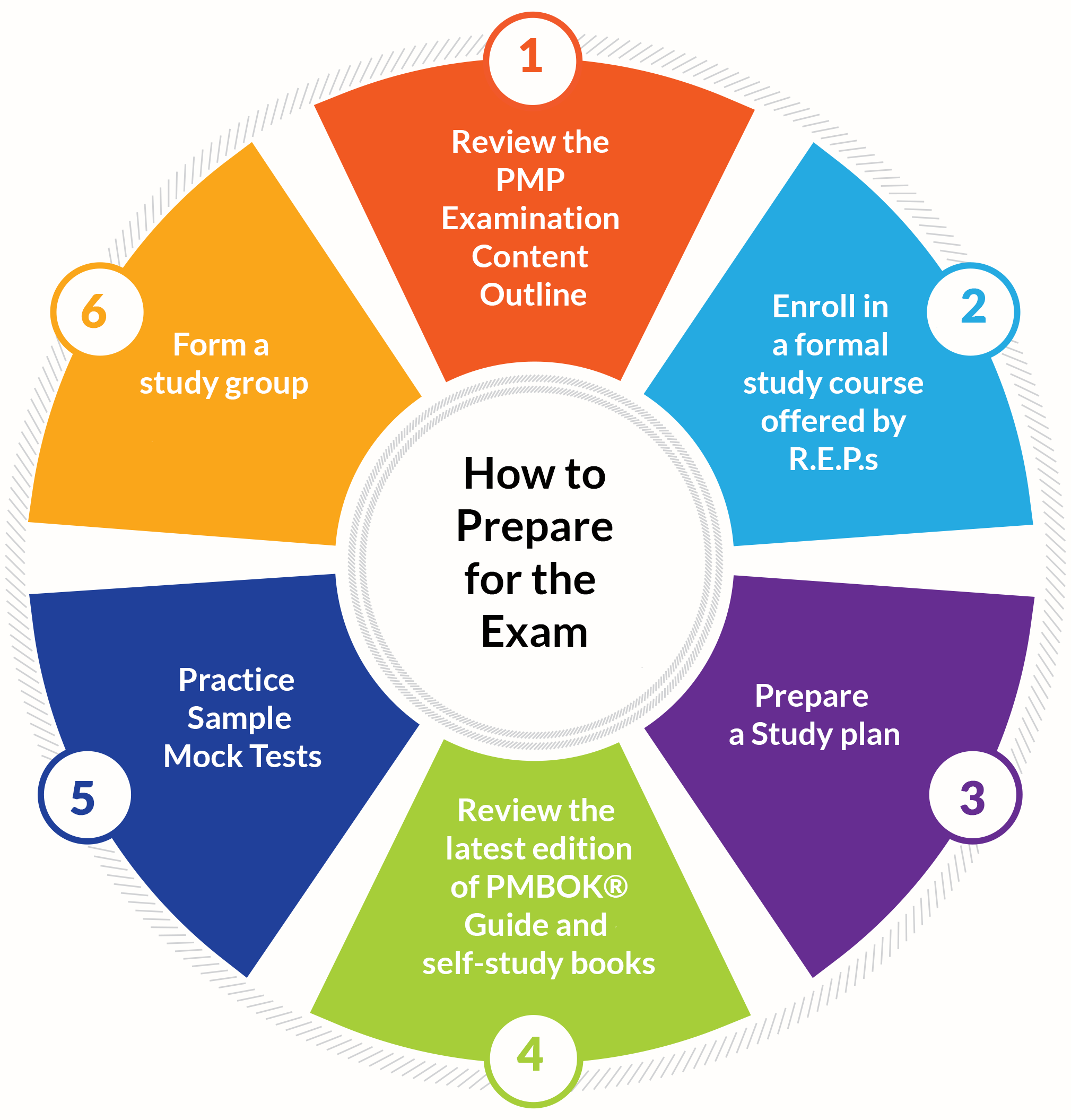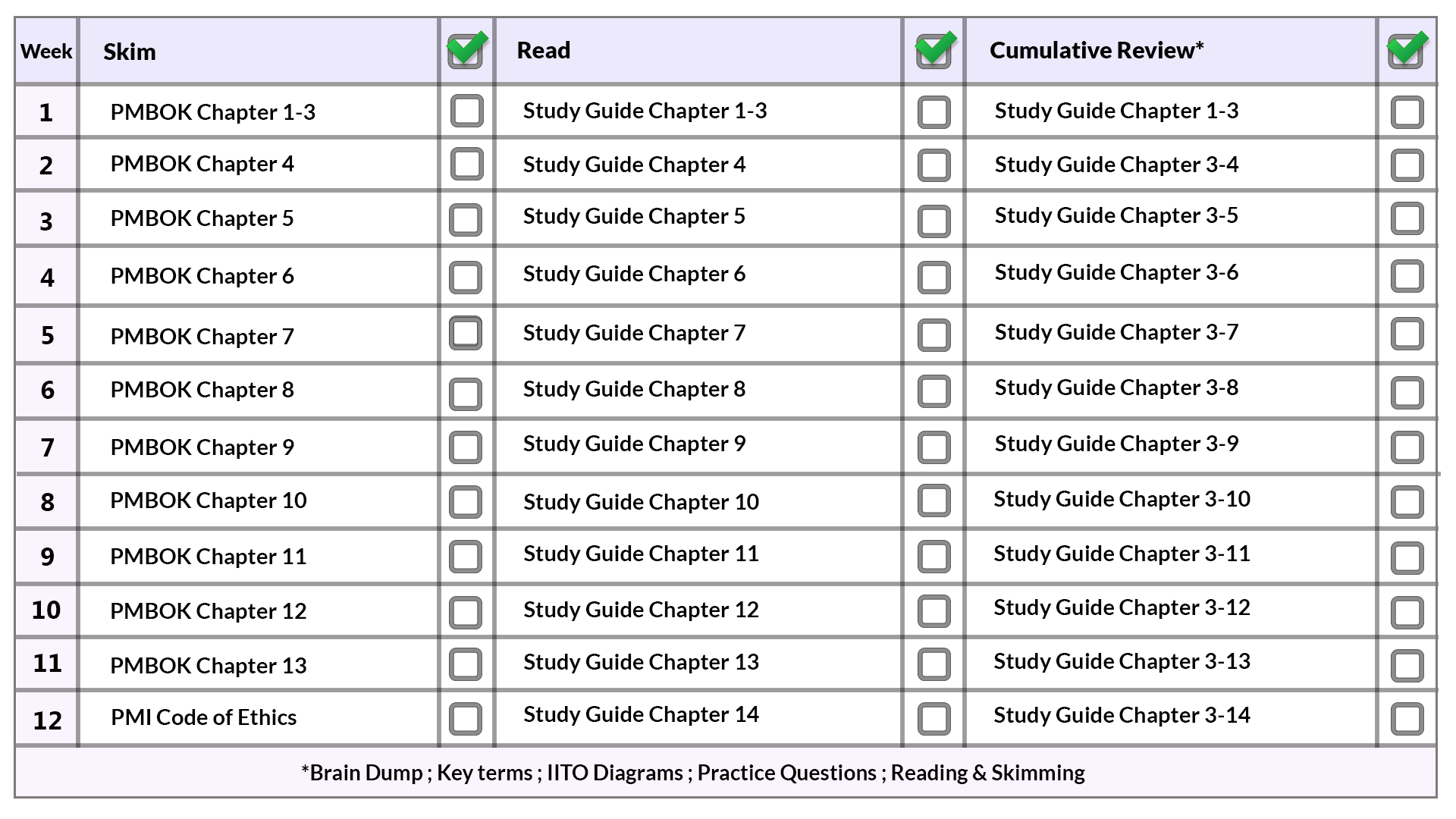Project Management Professional (PMP)
How to Prepare for PMP Exam
Cracking the PMP exam requires a great deal of commitment and thorough preparation. Serious and good exam preparation is inevitable, regardless of your experience and education. In the past, people with more than a decade of project management experience have failed just because they undermined the difference between being a successful project manager and being successful in clearing the PMP exam. Most of the successful PMP candidates spend 35 hours or more to prepare, so make sure to leave plenty of time for preparation before you take the exam. The images below show some of the best practices adopted by successful PMPs.

1. Review the PMP Examination Content Outline.
Going through the PMP Examination content outline document is a very important step towards doing well in the PMP exam. Published by PMI, this is the most credible document you can go to for the following:
Break up of questions as per the Process areas
List of tasks, skills, and knowledge required as per PMI’s Role Delineation study. Going through this gives you a high-level idea of what all get covered as part of the exam. Once you feel you have attained a reasonable command on the content covered by PMBOK (or a study guide you use) go through these and make sure nothing sounds unfamiliar
Here is a link to the PMP Examination content outline document:
2. Enroll in a formal study course offered by accredited Registered Education Providers (R.E.P.s).
Project Management Institute’s Registered Education Providers (R.E.P.s) are organizations approved by PMI to offer project management training. PMI started to accredit training providers to establish a global network of quality education providers to help hundreds of thousands of PMI Project Management Professional (PMP) ® credential aspirants and credential holders.
There are a few reasons why you may want to enroll in a training course on PMP. These courses provide tailor-made PMP study materials, best practices to prepare for the PMP Exam. They give you a quick start in getting a grasp of various project management concepts, terminology, formulae and other key inputs needed to get ready for the PMP exam. Most of the training courses also give you the 35 contact hours certificate, necessary for you to be eligible for the PMP exam.
3. Prepare a Study plan.
It is important you treat getting your PMP certification also as a project. Prepare a plan that covers all the activities that lead to your PMP certification. One of the sub plans to this, and a very important one is the study plan. Break your study sessions into smaller chunks and prepare a study plan which includes timelines to read PMBoK, practice mock tests, study various materials etc. Here is a sample study plan:

4. Review the latest edition of PMBOK Guide and self-study books published by other reputable training organizations.
It is recommended that you study the PMBoK Guide, no matter what other preparation tools you decide to go with. Within the PMBoK Guide, focus on page number 61. It contains a table that shows the relation between 13 Knowledge Areas and 5 Process Groups with 47 processes and how these are applicable in the project management. A number of PMP aspirants get this table by heart. They would make use of the first 5 minutes of their PMP Exam time to draw this table onto an empty sheet of paper so that they can use it as a reference in answering their 200 exam questions.
Along with the PMBoK Guide, you may want to review other study guides published by R.E.P.s and other reputable training organizations.
5. Practice Mock Tests to get ready for the exam
Mock Tests are often a very good indicator of your readiness to take the exam. They are very useful to identify the gaps in your project management knowledge. After taking a test you can review the results and focus on areas that you need to improve on.
Taking full-length mock tests is important for another reason - it is not easy to sit at a place for four hours at a stretch with a complete focus on answering questions. It is a physically daunting and mentally straining experience. However, it is required to get to your PMP certification. You better get used to it before it is too late.
6. Form a study group:
A good study group can be quite helpful. Check out local meet-ups (read meetup.com) and in case you don’t find one, form one. There are a number of benefits of being part of a meetup:
Studying in a group breaks the monotony of studying alone
It helps you to get help on areas that you are struggling with, and when you help someone your own confidence grows
Sharing project management experiences with others are very helpful in cracking a particular type of questions that PMP is notorious for - the scenario based questions
It helps you to motivate each other and stay on course
The biggest advantage is that it forces you to study on a regular basis, and makes the preparation activity a part of your routine
Check the below video to get in brief about the pmp exam tips and tricks.
Video Link:
https://www.youtube.com/watch?v=N1HTWt7n4K0 - Four Secrets to pass the PMP Exam.